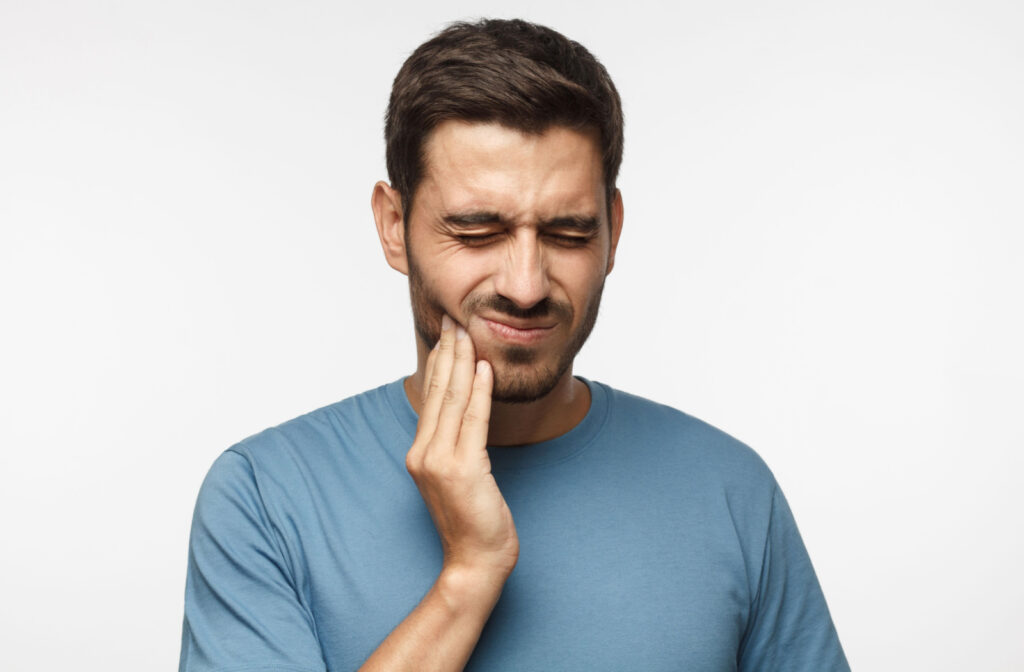If you’ve ever had a toothache that somehow made your head ache, know that it’s not just bad luck. Your toothache could radiate through your jaw and facial muscles to become the sneaky cause behind that unwelcome headache.
Nothing ruins your day like pain, and it could be a sign of something that requires immediate attention. So you may be excited to learn that your dentist can help you feel better from toothache to headache.
How Can Dental Problems Lead to Headaches?
How can a small tooth cause a headache? It’s all about proximity and nerves. 12 nerves, actually. This intricate network in our jaw connects to different muscle groups, some reaching all the way up to our head.
The biggest cranial nerve is the trigeminal nerve. This nerve transmits sensory information to the face, including touch, pain, and temperature. Because toothaches can occur so close to the trigeminal nerve, they can shoot that pain up to your sinus and temples. The result? A headache.
With all these nerves running all over the place, pinpointing the source can make it difficult. For example, while a toothache can cause a headache, you could also simply have a toothache and a headache. Or you could have a separate issue causing both. That’s where your dentist comes in.
Common Culprits for Toothaches
A toothache can be hard to ignore. It can be mild or severe. It can even only happen occasionally—or be a constant disruption. And when it comes to dental problems, certain culprits are notorious for causing pain. Common causes of toothaches include:
- Cavities
- Cracked or broken teeth
- Gum disease
- Infection
- Damaged fillings
- Teeth grinding (bruxism)
Sometimes, pain can be deceptive, appearing in unexpected places.
Cavities, also known as tooth decay, are particularly known for causing toothaches as the decay irritates your nerves. Gum disease, with its swelling and inflammation, affects your teeth and can cause muscle tension and lead to headaches.
And let’s not forget about TMJ disorders, which involve the joint connecting your jawbone and skull. Issues in this area can result in jaw pain, often becoming a persistent headache.
How Can A Dentist Treat Headaches?
If you’re experiencing unexplained headaches, an oral assessment might reveal the hidden dental drama behind it all. If that’s the case, dentists have a range of treatments depending on the problem.
Whether it’s treating cavities with fillings, resolving dental problems with root canals, or addressing TMJ issues with a mouthguard, addressing dental issues can make a significant difference in relieving headaches.
Fillings for Cavities
Cavities happen, but prioritize addressing them right away! Typically, dentists utilize a filling to fix the issue. Think of it as using spackle to smooth over a hole in your wall.
This procedure involves removing the decay, thoroughly cleaning the area, and filling it with a composite material. This straightforward process can eliminate cavity-related pain and promote a healthy tooth, resulting in more smiles.
Root Canals
If you’ve got a cavity that’s caused some serious damage and made itself at home, we might need to discuss root canals. This involves removing infected tissue, cleaning the inside of your tooth, and sealing it up.
Mouthguards for Teeth Grinding & TMJ
The temporomandibular joint (TMJ) is basically the hinge connecting your jawbone to your skull, allowing you to talk, chew, and yawn. Despite how simple that may sound, it’s a complex web of muscles, bones, and ligaments.
When something’s not quite right with this nifty joint, we call it a TMJ disorder (TMD). It can lead to some downright annoying symptoms, such as:
- Jaw, face, shoulder, neck, or head pain
- Your jaw feeling locked or stuck
- A painful click or pop
- Difficulty chewing food
- An uncomfortable bite
- Headaches
TMDs can be hard to diagnose since what’s behind them is not always clear. Stress can be a significant factor, but TMDs can also be a symptom, or even the cause, of teeth grinding. All in all, this is a painful recipe for headaches.
A common treatment for TMDs and teeth grinding is nighttime mouthguards. You often don’t even know you’re grinding your teeth because it happens at night. Picture them as custom-designed armour for your teeth, protecting against grinding and helping your jaw muscles relax for a refreshing morning.

Preventing Toothaches at the Source
Dental care isn’t just about fixing problems—it’s about stopping them before they start. Maintaining your dental hygiene can help prevent headaches linked to dental issues. Brushing, flossing, and regular oral assessments are some of your best tools against cavities and, by default, those related headaches.
At Hometown Dental, our goal is to make dentist visits enjoyable for the entire family because we believe that a family that prioritizes dental care stays cavity-free together!
Ultimately, preventive dental care aims to keep everyone’s smiles bright, healthy, and comfortable. Remember, a little prevention goes a long way, and we’re here to help you combat toothaches, one check-up at a time.
Book your next oral assessment and visit with the hygienist today before it becomes a headache.




